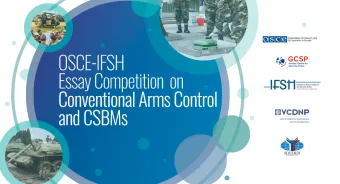Winners of essay competition on arms control and confidence- and security-building measures in Europe announced

Winners of essay competition on arms control and confidence- and security-building measures in Europe announced
The winners of the OSCE–Institute for Peace Research and Security Policy at the University of Hamburg (IFSH) Essay Competition: Conventional Arms Control and Confidence- and Security-Building Measures in Europe were announced today at a virtual award ceremony held during an OSCE Forum for Security Co-operation (FSC) meeting organized by the German FSC Chairmanship.
The first-of-its-kind essay competition was launched in March 2020 and invited students and young professionals under 35 years of age from OSCE participating States and Partners for Co-operation to submit original essays on five topics related to conventional arms control and confidence- and security-building measures (CSBMs) in Europe.
The goal of the competition was to strengthen youth engagement in the field of arms control and CSBMs through a joint initiative between the OSCE and its long-standing partners and experts: the IFSH, the Geneva Centre for Security Policy (GCSP), Moscow State Institute of International Relations and the Vienna Centre for Disarmament and Non-proliferation (VCDNP).
“The generation of ‘arms control negotiators’ from the 80s and 90s have reached peaks in their careers and are now starting to retire. The active political knowledge about arms control is therefore dwindling,” said Gesa Bräutigam, Ambassador and Permanent Representative of Germany to the OSCE, during her opening remarks at the ceremony. “We need the young generation of specialists on conventional arms control and CSBMs who will promote and develop it further either as members of diplomatic service or academia. To add our contribution to develop this generation of young practitioners, the OSCE’s Conflict Prevention Centre (CPC) has developed the essay competition. Today is the pinnacle of that competition.”
Ambassador Tuula Yrjölä, Officer in Charge/Secretary General and Director of the OSCE CPC announced the three winners of the competition who then presented their essays to the ceremony participants.
First prize was awarded to Benjamin Schaller (Germany, Arctic University of Norway in Tromsø) for his essay that considered the “untapped potential” of European arms control and laid out policy proposals and recommendations on how to strengthen the role of the OSCE.
The second prize went to Naomi Egel (USA, Cornell University) whose essay explored how the OSCE’s history, structure, and political position offers a distinct, yet often overlooked approach to arms control, non-proliferation, and disarmament.
Anastasia Prokhorova (Russian Federation, Central European University) was awarded the third prize for her essay that examined perceptions of the OSCE in reducing military risks in Europe and the organization’s innovative approach to security.
The winners each received cash prizes of up to €3,000 and an all-expenses paid trip to Vienna to attend a future FSC meeting. Other prizes for the winners and runners-up included a spot in the Non-Proliferation and Disarmament Short Course offered by the VCDNP, book vouchers of up to €500, and an opportunity to intern with GCSP. Adapted versions of the winning essays will also be published in GCSP’s Strategic Security Analysis Series.
The winning essays were selected from 96 entries submitted by participants in 36 OSCE participating States and Partners for Co-operation. Each entry was evaluated anonymously by a jury of experts from the field using a process and scoresheet defined prior to the competition launch. Of the entries received, 44% were from female participants.
“The main purpose of this initiative is to bring young talented students and professionals closer to the topics that we discuss here in the FSC every week. We hope that some of them will choose to continue working on these important topics in the future,” said Yrjölä.
Representatives from each organization supporting the competition were also invited to speak and shared details about the competition, its development, and the selection process. They highlighted continuing efforts to support current and future competition participants, and to expand on the competition’s momentum by developing further joint initiatives.
“The academic community needs the inflow of the young generation of experts who will be able to support future negotiation processes and in this manner contribute to more stability, predictability and security in the Euro-Atlantic region,” said Cornelius Friesendorf, Head of the Centre for OSCE Research (CORE) at the IFSH, who spoke on behalf of all the partners involved in the competition. “The future belongs to the youth, and that is why they should engage in forming the future security landscape. That is why we have joined this initiative without hesitation.”
Read more about the winners and their entries here: https://www.osce.org/forum-for-security-cooperation/473055
Please note that this article was first published by the OSCE here.
